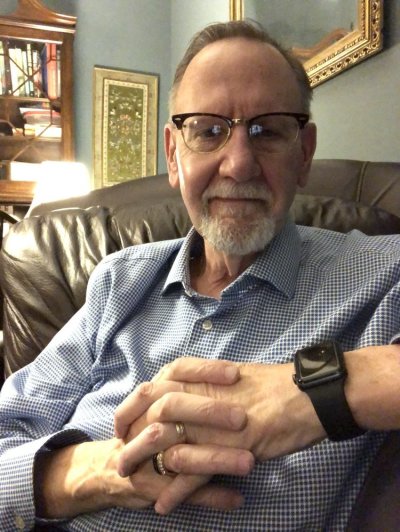Biblical counselor finds redemption in Christ after struggling with homosexuality, transgenderism

A Biblical counselor who once contemplated suicide over his struggles with homosexuality and transgenderism shared his incredible story of redemption — and why he’s able to now “rejoice” in his journey.
In a recent article posted on The Gospel Coalition, Jim Pocta, a psychotherapist and biblical counselor in Dallas, shared how at the young age of 5, he believed he was a girl in a boy’s body.
“Somehow I just knew it,” he wrote. "And I also knew there was something wrong with that, so I’d just have to keep it to myself. After playing dress-up with my six sisters, I’d get to wear their dresses when no one was looking. I’d be the princess in secret. Relief. Other boys had dreams of playing in the World Series; I dreamt of becoming a fabulous woman with a handsome boyfriend.”
But growing up the son of an alcoholic, ex-military father with violent tendencies, Pocta knew it wasn’t safe to share his secret: “He’d never understand—indeed, he didn’t when I told him at 14 that I might be gay. He regaled me with tales of his glory days, beating up gay men in downtown Cleveland when they showed interest. I quickly recanted and knew I’d have to live this one out alone. He was ashamed, and passed that on to me,” he recalled.
Although he briefly encountered the Gospel at the age of 18, Pocta was informed he’d lost his salvation because of his same-sex tendencies. At that point, he decided to join the Navy and immerse himself in the gay community.
While in the Navy, he met a sailor, Tom, who was interested in doing a Navigator’s Bible study with him. Pocta agreed but didn’t tell Tom he was gay and transgendered.
“I’d work as a Navy cook during the day, meet with Tom, and memorize his verses. Then I’d go home to my people, where I’d cross-dress and engage in drunken immorality. No one was the wiser. It was the perfect double life,” he said.
It wasn’t long before Pocta was baptized at a megachurch, solidifying his commitment to “play-acting.” The Navy eventually sent him overseas, where he decided to leave his former lifestyle behind — at least on the surface.
While overseas in the Philippines, Pocta met Linda — a school nurse on base who was interested in ministry — and proposed. After marrying, the pair moved to Dallas, where Pocta began attending Dallas Bible College.
“Life was going to be great . . . except for this nagging same-sex attraction and desire to be a woman. I couldn’t shake it. I tried and tried to deny it, but it wouldn’t go away. So I faked it harder,” he said.
After Linda became pregnant, Pocta felt he needed to share his secret with her. He began meeting with a pastor struggling with similar issues, and then another. Slowly, a “support group” began forming, and men decided to start a ministry to gays and lesbians during the AIDS epidemic of the mid- to late-'80s.
“It was a frenzy of expectation, trying to help so many desperate souls stop behaving recklessly,” Pocta said. “I was doing all I could do to white-knuckle it, to live up to my own demands, and to pretend as best I could.”
Soon, his veneer began to crack: “Boundaries failed. People got hurt. Relationships crumbled. Eventually I left the ministry, then the church, and finally God. I essentially abandoned my dear wife. I had failed my sons. I proved myself useless, hopeless, helpless.”
Struggling with depression and bipolar disorder, Pocta contemplated suicide and began writing his final letter: “I’ve faked it as long as I can fake it, and I can no longer make it.”
But as he prepared his final instructions for his wife, she walked in the door much earlier than expected, thwarting his plans. She informed him he needed to grieve the hurts of his past, forcing him to grapple with the abuse, the put-downs, bullying, and humiliation he’d endured throughout his life.
“That’s when I realized Jesus could have stopped it all, but he didn’t. He must have had something better in mind,” Pocta said. “Redemption. That was what he was planning for me.”
“By not being afraid to feel the pain that comes from sin, sorrow, shame, and suffering, we find reconciliation and redemption. In fact, we find what we were hungry for all along: Jesus himself.”
After repenting and truly mourning his past, Pocta said he’s now able to “love Linda as the man I was designed to be” and “be a real father to my three sons.”
“I can rejoice in my story today—all of it—because Jesus’s fingerprints are over every page,” he wrote. “I can embrace my story because I have been embraced by the Author of my story.”
Today, he heads Pocta Counseling in Dallas, Texas. "Pocta Counseling we join our client’s journey to seek God and His will together," notes the website. "We treat our clients with empathy, compassion, and honesty, walking with those in distress, towards renewal through the Gospel. Pocta Counseling has helped those struggling with depression, anxiety, sex addiction, anger, suicidal tendencies, and marital issues."
In recent years, a number of men and women who once lived and identified as LGBT have shared stories of how encountering Jesus transformed their lives.
Edward Byrd, a worship leader who previously lived a lifestyle of homosexuality, told The Christian Post that the greatest misunderstanding about those who have left the LGBT life behind is that they are self-loathing and are suppressing their sexual desires.
"They think we are not happy, they think we are unfulfilled when in all actuality we are living our best lives. Not saying it’s always easy but the real joy, peace and freedom we have is nothing I ever known before," Byrd said.
Like himself, the “majority” of those who leave the LGBT lifestyle behind never experienced “conversion therapy” but rather, an encounter with the Holy Spirit that changed their lives.
"I had never even heard of conversion therapy. I’ve seen references of it in the past but didn’t come into the knowledge of what it really was until recently," he said. "None of us were ever forced to change or put in a camp; it was a decision that we made to follow after Jesus and His love."





















